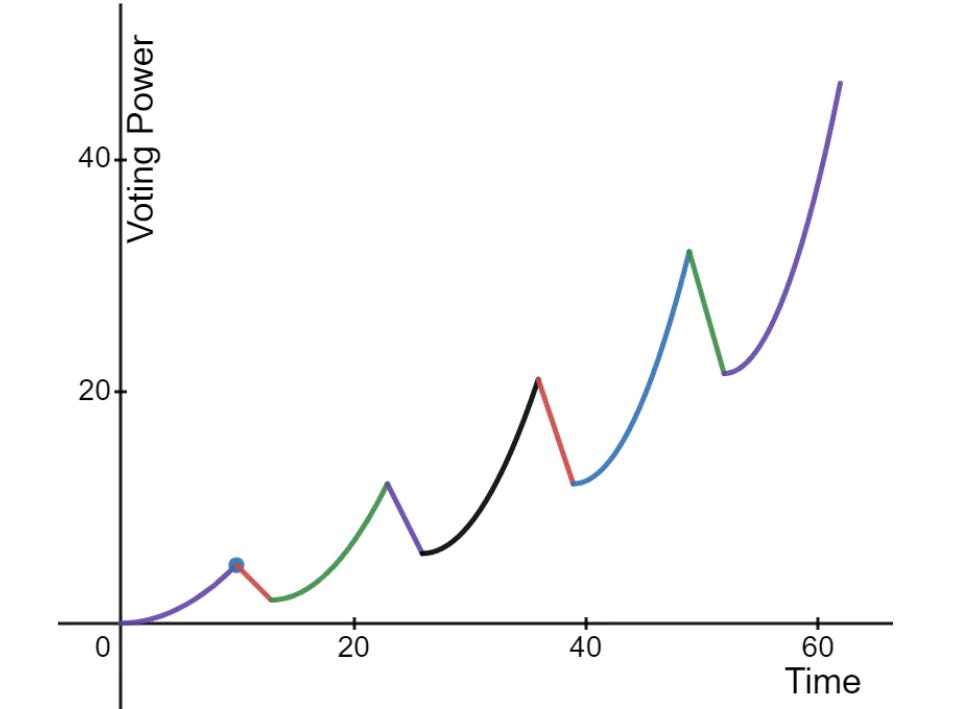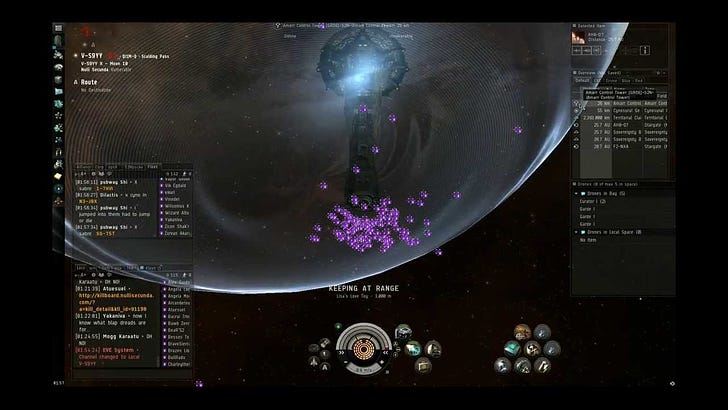We left off with The Citadel Game hypothesizing about a badge and season system, where high value contributors, or those that have completed an educational program get attestations and on-chain badges that then allow access and later entry into governance roles.
Also recall Vitalik’s prescriptions for systems that fix coin-voting.
Limited Governance
Non-coinvoting schemes such as proof of personhood and proof of participation systems
Skin in the game solutions where your vote decides your payout
I think games are in a unique position to implement these measures and are the perfect experimentation ground for non-coinvoting governance systems.
Reputation Scaled Systems in Games
For past work on this see:
Power to the Players - Governance where I outline the first proposal of voting power scaled exponentially to levels, a time based voting power decay to combat gerontocracy
Proof of Participation Voting for Onchain Governance where I did some rudimentary math to show that it is possible to create a Sybil resistant scaled voting system with assumptions on bot catching and gas costs.
Also recall from Game Governance 3, that in OSRS voting only those with more than 300 total levels and 25 hours of gameplay and are members can vote on polls.

The general idea is to use available data in game ranking that is a proxy for one’s participation in the ecosystem (levels, ranking, clans) to grant a portion of total voting power scaled to this proxy. For instance, you could create a system where players hold 50% of the voting power scaled linearly and the token holders hold 50%, noting that if the game emisses the governance token that there would be significant overlap between the two constituencies (which is what we want).
The additional complexities and optimizations that you could theoretically layer on top of this system is enormous. Here are some examples
Give people augmented voting power depending on other criteria - contributions to the community like content creation, tool building, esports…etc.
To combat gerontocracy and free riding, we could operate this on a season to season basis. ie) at the start of every season those who contributed in the previous season would get augmentation tokens that would further boost their participation based voting score or their token based voting score.
The complexity of managing an automated or non-automated system of choosing who to grant these boosts to (esp in a world with tangible, valuable governance capture) would be a difficult problem.
But the extent to which these are like airdrop optimizations - useless, everything leads to dumping - or meaningful advances in decentralized game governance in practice, I think will only be seen after a successful implementation of these ideas.
Some possibilities that would be cool with such a system
A clan of high level players banding together to lock their tokens into a guild and vote as a single block, representing the interests of the elite player base - game political parties
Council or initial team being able to recognize contributions outside of skill in-game to the ecosystem, such as tooling builders, educators, meta-theorizers, or really anything they would want to incentivize through meaningful increased “voice” in decision making not just token emissions
Like 1 and 2. The emergence of the “meta-game” - political entities contributing and playing to gain more influence within the game for the purpose of swaying the game in a certain direction - many Eve Online players quite enjoy this.
Decentralized Gaming Studio?
All models we’ve previously outlined in this series have focused on implementing community ideas on a select scope within the game (ILV is pushing the boundaries here). The difficulty is in recognizing that different aspects of the game require different expertise. Each portion, whether content, economics, bugs, biz dev, partnerships probably has a different optimum community feedback structure, constituent decision makers, and also depends on the type and maturity of the game.
The Citadel Game and badge based participation systems give us an idea how to curate such a working group as a subcommittee for each DAO, yet we are yet to see this executed successfully in practice at a larger scale. This is something we’re working on at Metaportal DAO that we’re very excited to release soon.
Conclusion
I think games are the perfect place to experiment with governance structures.

People just care that much more about their games and
In an age of waning personal involvement in community and government, it was hard to overvalue the rare, empowering taste of politics in action that so many MOOers had been afforded by the [LambdaMoo]. Moo society was, if nothing else, a hands-on political education for its members.
I’m extremely excited to help build the next generation of game governance systems.



